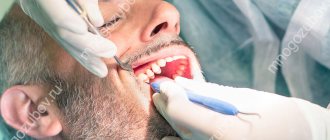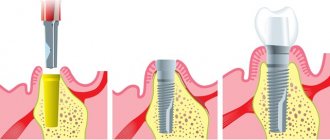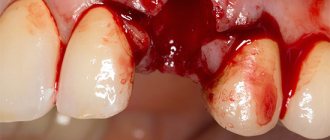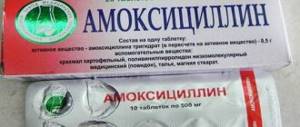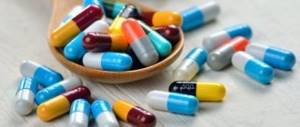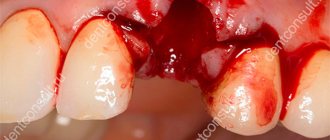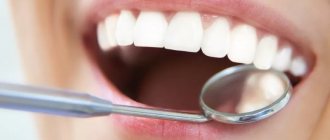Implantation is a serious dental surgery. After it, the patient must follow certain rules that make the recovery period safe and painless and minimize the risk of developing dangerous complications. Antibiotics should be taken during dental implantation only if prescribed by the attending physician. The patient should not prescribe anything for himself.
How does surgery affect the body?
Dental implantation is a much more complex procedure than, for example, caries treatment. This is already an operation, and during it tissue injury is inevitable - gums, jaw bones, riddled with blood vessels. After all, to install an implant, you need to cut the gum and drill a hole into the bone. And since hundreds of millions of pathogenic microorganisms (bacteria, fungi, protozoan parasites) are constantly present in the oral cavity, there is a risk that they will penetrate deep into the tissues around the implant or spread throughout the body through the bloodstream. As a result, implant healing will slow down, or peri-implantitis may begin or rejection may occur.
Injury to oral tissues triggers reactions in the body aimed at their restoration. Therefore, after the end of anesthesia, a person often feels pain and notices that swelling has appeared on the cheek. The gums may bleed slightly in the area of the sutures in the first hours after installation of the implants. To relieve pain, swelling and, to some extent, inflammation, dentists prescribe painkillers and antihistamines to patients. But they cannot cope with the infection, and the body itself is also not always able to resist pathogens. To reduce the risk of infection, antibiotics may be prescribed during implant placement[1].
Antibiotics or antimicrobials, as the World Health Organization prefers to call them, include 3 groups of drugs. These are antibacterial - bacteriostatic inhibit the proliferation of bacteria, and bactericidal kill them. Next come antifungal or antimycotic drugs - they act on harmful fungi, such as Candida. The third group is antiprotozoal, which suppress the vital activity of protozoan parasites (amoebas, plasmodia). They do not kill viruses, because... act specifically against bacteria.
Nutrition after implantation
The gums remain insensitive for 3-5 hours after implantation. You should not eat food until the anesthetic wears off. Otherwise, you may accidentally damage the mucous membrane or get burned.
It is recommended to eat semi-liquid, liquid and pureed food for 10 days. Spicy foods, alcohol, crackers, hard bread, spices, and smoked foods are prohibited. These products irritate the mucous membranes, increase blood flow and can contribute to the spread of infection.
Indications for the use of antimicrobial agents
Is it necessary to take antibiotics after dental implantation? Here everything depends on several factors - the extent of the intervention, the time of installation of prostheses on implants, the health of the patient himself, etc. Let’s take a closer look at the indications when it is necessary to take antibiotics after implantation (but let’s immediately make a reservation that you should take medications only as prescribed by the dentist):
- more than 2 implants are installed at the same time: for example, with complex techniques, from 3 to 14 implants can be placed on the dentition - and this means increased traumatism,
- One-stage implantation was performed: i.e. the implant was placed immediately after the removal of a tooth or root, around which there may be inflammation,
- immediate prosthetics are planned: in a situation where prostheses are placed immediately or 3-4 days after the surgical stage, it is necessary to completely eliminate the risk of infection and “help” the implants take root faster,
- osteoplasty[2] and/or sinus lifting was performed: when replanting the bone or raising the bottom of the maxillary sinus, it is also necessary to minimize the likelihood of inflammation,
- the patient has granulomas or cysts under the tooth roots: of course, they will be removed, but a small focus of infection may remain in the tissues,
- the patient has chronic diseases: for example, dental diseases - gingivitis, periodontitis, periodontal disease, stomatitis, osteoporosis, as well as diseases of the throat and nasopharynx,
- impossibility of carrying out high-quality oral hygiene: the maximum number of microbes is found in the mouth 12 hours after the previous cleaning. And if they are not removed, then the local immunity (already “working” so intensely after the operation) may simply not be able to cope with them - as a result, inflammation develops,
- weakening of general immunity or changes in hormonal levels: for example, if the patient is not in very good health, has recently suffered from an illness, or has diabetes mellitus in a compensated form. Women during menopause are also often prescribed a certain antibiotic after dental implantation.
There may be other (individual) indications for the use of antibiotics not only after, but also before dental implantation. This includes the already mentioned chronic diseases. The dentist can also prescribe antimicrobial agents a few days before the installation of implants - if tests in preparation for treatment showed a slightly increased content of leukocytes, or a large number of pathogens were detected in the smear. Patients who decide to transform their smile during the epidemic may be prescribed antibiotics and vitamins - which must be taken before dental implantation (1-2 days before). After the surgical stage, taking prescribed medications, as a rule, continues.
Implantation is very stressful for the body
During implantation, in most cases, an incision is made in the gum, after which sutures are placed on it. On the first day, in order for the mucous membranes to recover, you need to care for the wound as carefully as possible. Any little thing can provoke inflammation and suppuration. The success of the post-implantation period is influenced by:
- the general health of the patient;
- professional skills of an implantologist;
- the type of implant used and the method of its implantation;
- patient compliance with medical recommendations.
Once the titanium pin is installed, postoperative therapy is prescribed. It is designed to speed up regenerative processes and prevent the development of infection. Antibiotics can be its basis.
Medicinal substances and requirements for them
Antibiotics for implantation, as already noted, can belong to three types - antibacterial, antifungal and antiprotozoal agents. Some substances have a combined effect - for example, they simultaneously affect both parasites and certain bacteria. Also, one drug can combine several substances (usually antibacterial), which act in combination on different groups of pathogens. But any antibiotics must meet the following requirements:
- effective impact,
- minimal risk of allergic reactions,
- modern production from purified raw materials,
- minimum number of contraindications,
- minimal side effects,
- convenient form of administration: as a rule, drugs are presented in the form of suspensions or tablets, film-coated or dispersible. The latter disintegrate into tiny particles upon contact with liquid - water or saliva.
Frequently prescribed drugs
It is immediately worth noting that the list of antibiotics presented below are drugs that are prescribed only by dentists after dental implantation. Self-administration of such medications “at will” is prohibited! After all, a dentist is a professional who sees the complete clinical situation in front of him and knows what to prescribe for a specific patient (if at all necessary) and not do harm.
Antibacterial drugs
Antibacterial agents from the group of penicillins and fluoroquinolones have a wide spectrum of action on bacteria “living” in the oral cavity. Penicillins are, for example, Amoxicillin, Flemoxin with the active ingredient amoxicillin (belongs to the 3rd generation penicillins). Amoxicillin can also be “enhanced” by the action of clavulanic acid - “Flemoklav”, “Amoxiclav”. Penicillins have a wide range of effects on staphylococci and streptococci.
Often in dentistry, Ciprolet and similar drugs with the active ingredient ciprofloxacin (belongs to the 2nd generation fluoroquinolones) are prescribed. It is active against many strains of staphylococcus, Pseudomonas aeruginosa, as well as some protozoan microorganisms.
Antiprotozoal antibiotics
During implantation, antiprotozoal drugs with an antibacterial effect can be prescribed - metronidazole and tinidazole (the drugs have the same names). They affect protozoan parasites and some types of anaerobic bacteria. When taken in combination with antibacterial agents that suppress aerobic bacteria, they enhance each other’s effects (synergy effect).
Combined products
A popular combination drug with a wide spectrum of action is Tsifran ST. One tablet contains 2 active ingredients at once - the antibacterial ciprofloxacin and the antiprotozoal tinidazole. The components are bioavailable, quickly penetrate the body tissues and have a complex effect on pathogens, reducing the risk of complications after implantation.
Antifungal drugs
Antimycotic agents are active against microscopic fungi. For example, Fluconazole suppresses Candida fungi. Or, more simply put, it treats candidiasis (thrush), which often appears in the oral cavity in patients with weakened immune systems or during long-term use of strong medications.
Is it possible to carry out simultaneous implantation?
Patients are attracted by the opportunity to undergo implantation immediately after tooth extraction or loss. But this is not possible in all cases. Immediate implantation is carried out if there is sufficient volume and level of bone density. Otherwise, the implant will not be able to take root well.
If the bone is less than 2-4mm, it is more likely to be resorbed, causing the gums to recede. Weak bone tissue should not be subjected to chewing loads. The implant may become loose. Then it will need to be removed.
Immediate implantation is used in cases of unexpected tooth loss, for example, during an accident or sports training. In this case, the jaw bone has full volume and can be used to install an artificial root.
You will learn more about possible complications and rules for recovery after implantation from the specialists of our dental clinic.
Dosage and regimen
Is it necessary to take antibiotics after installing an implant in the dosage prescribed by the implantologist? Yes, definitely, because... it is necessary for the required amount of medicine to penetrate into the tissues. If you drink, for example, not the conventional 500 mg, but 250 mg of the drug, the effect will be weaker - and the recovery, accordingly, will be longer. If, on the contrary, you increase the dosage yourself, then there is a risk of side effects.
The dentist-implantologist calculates the dose and frequency of administration of the drug in accordance with many factors - body weight, age of the patient, the presence of chronic diseases. And also over time, after which the maximum concentration of the drug in the blood will be reached, and when it begins to be eliminated from the body. Most often, antibiotics are prescribed 3 times a day, but according to indications, double or single doses are possible.
Moreover, it is important to follow not only the dosage, but also the rules of administration. Some drugs need to be taken before meals, others - during, but most - only 20-60 minutes after eating (so the drug is completely absorbed). Therefore, carefully read the instructions for each medicine. As a rule, antibiotics are washed down with clean water at room temperature - at the rate of 0.5-1 cups per 1 tablet.
How to recover quickly
It's no secret that antibiotics are serious medications and it is better not to take them unless absolutely necessary. After all, when they enter the human body, they destroy not only harmful, but also beneficial bacteria.
In order to quickly minimize the negative impact caused by their use, it is necessary:
- eat a balanced diet, enrich your diet with fruits and vegetables;
- drink a lot of clean drinking water without gas;
- take vitamin and mineral formulations;
- devote time to hardening procedures.
To improve the functioning of the gastrointestinal tract, you should take medications with bifidobacteria and lactobacilli, and eat natural yoghurts.
Side effects and what to do about them
Taking antibiotics can lead to side effects, which is absolutely undesirable after implantation, because the body has fewer free resources for their full engraftment. Let’s take a closer look at the list of common “side effects” (but let’s immediately note that they occur in a minimal number of patients):
- dry mouth, decreased appetite,
- nausea, abdominal pain,
- diarrhea or constipation,
- skin rashes,
- headaches, sleep disturbances,
- increased heart rate, decreased blood pressure,
- tinnitus, visual disturbances,
- impaired attention, anxiety.
If side effects cause discomfort, you should stop taking the medicine and contact your dentist to adjust your treatment. It is likely that the doctor will additionally prescribe the use of lacto- or bifidobacteria, prebiotics. If pronounced side effects occur - shortness of breath, difficulty breathing, swelling, severe nausea, hallucinations, loss of consciousness, anaphylactic shock, you should immediately seek medical help.
“After the implants were implanted, the doctor gave me a list of medications and told me what and how to drink. And he also said to be sure to take Suprastin. Firstly, it relieves swelling, and also prevents allergies to antibiotics from appearing (which makes the skin on my hands itchy). I was prescribed Tsifran to take for a week. It helped well, I have something to compare with. One day a tooth was removed and another medicine was prescribed. So there wasn’t much use for him.”
Mikhail, review from gidpozubam.ru
Should I take antibiotics or not?
There is a lot of controversy about whether those who have recently become the owner of a dental implant in the oral cavity need to take antibiotics. In order to avoid complications after implantation of artificial rods, various types of antibacterial therapy are offered, but there is currently no substantiated data on this issue.
After the research, it became clear that after implantation, complications associated with the development of infection are not very common. For this reason, some experts say that there is no need to use antibiotics after the implantation procedure.
But there are also doctors who recommend starting to take the medications in question the day before the operation and on the day of it.
Note: We can only say with certainty that taking antibiotics will definitely be recommended by a doctor if the implantation was very long and complex along with painkillers.
If the case was uncomplicated, a minimal tissue incision was made during the procedure, and the bone tissue was in perfect order and in the required quantity, antibiotics may be considered an unnecessary measure.
Exactly what antibiotics will be prescribed depends on the individual case. Prescriptions of drugs are individualized, depending on the results of tests taken before implantation.
Cost of antibiotics for implantation
The price of antibiotics after implantation depends on the drug, accompanying medications (to restore the gastrointestinal microflora) and how much to take. The minimum cost of packaging an antimicrobial agent, which is designed for 5 days, is 150 rubles. A full-fledged “post-implantation first aid kit” can cost 1000-2000 rubles, because it also includes other drugs - painkillers, antihistamines, vitamin complexes.
[1] Ushakov R.V., Tsarev V.N. Antimicrobial therapy in dentistry. Principles and Algorithms, 2021.
[2] Alfaro F.E. Bone grafting in dental implantology. Description of methods and their clinical application, 2010.
Author: Bespalov R. D. (Thank you for your help in writing the article and the information provided)
Timing for suture removal
The sutures after implantation are removed on days 10-14. The procedure is painless and does not require preparation. Strong threads connecting mucous tissues do not separate during chewing of food. But in any case, you should be careful: it is forbidden to touch the dental floss, pull it, or damage hard parts with food or hygiene products.
